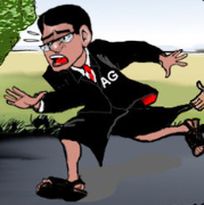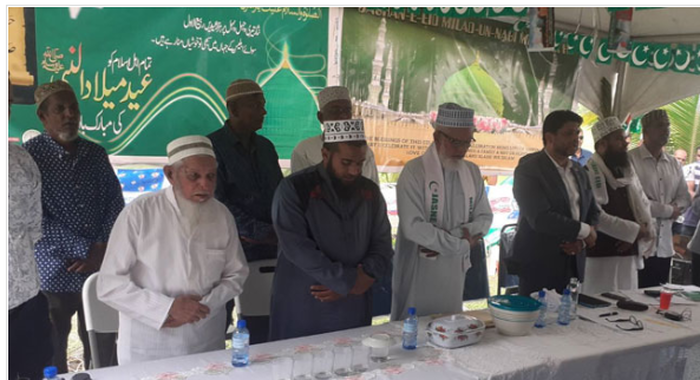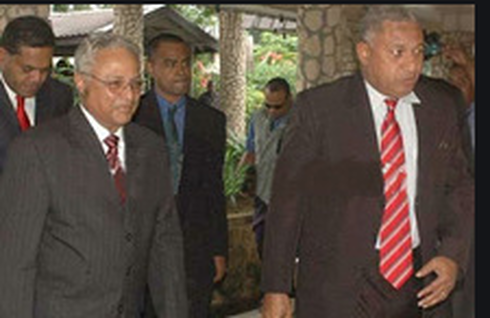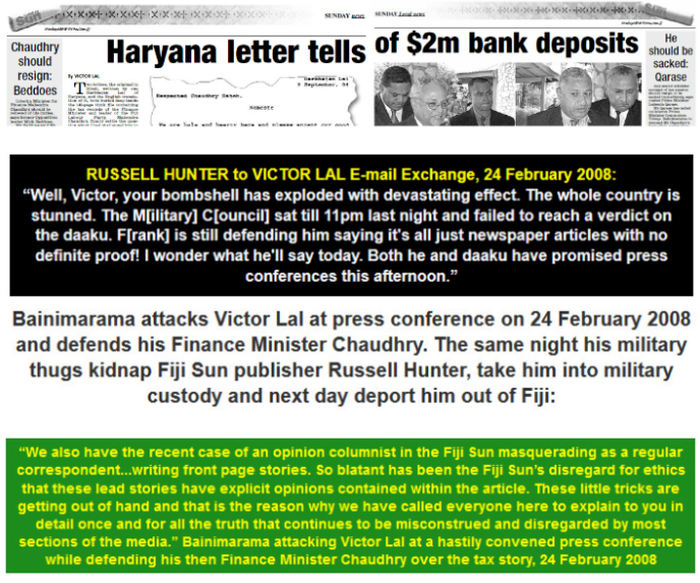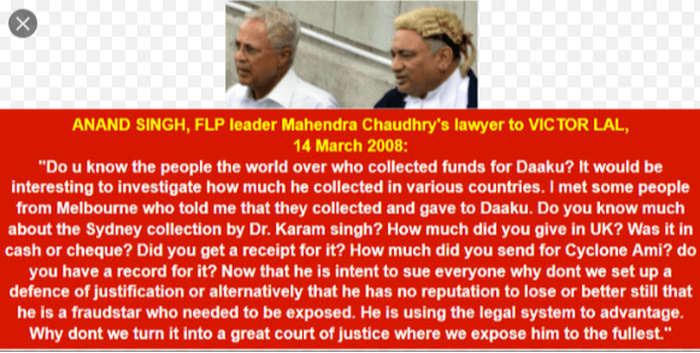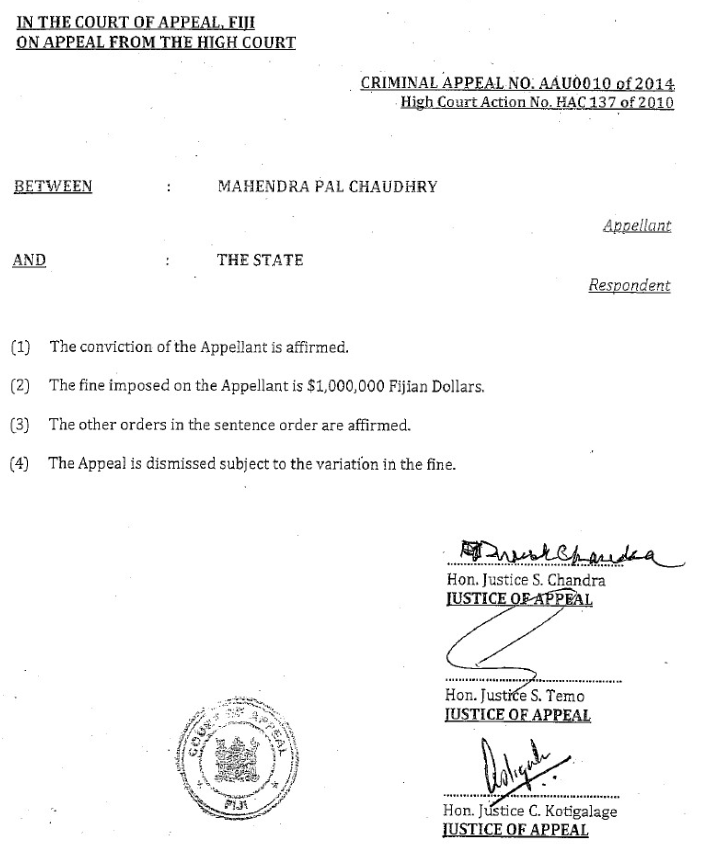THE ALLEGED BOMB MASTERMIND AND HIS RECRUITER FLED TO AUSTRALIA AND CANADA ON THE DAY OTHER ALLEGED BOMBERS APPEARED IN SUVA COURT. While those rounded up languished in Naboro, he was play-acting in Australia
Was Aiyaz Khaiyum the MASTERMIND behind the BOMBINGS? The day his alleged foot soldiers appeared in COURT, he was seen filling up petrol with his NUMBER TWO and later driving off to the Nadi International Airport. They claim he betrayed them and fled to Australia to do a DRAMA COURSE. His alleged NUMBER TWO, another Indo-Fijian Muslim, fled to Canada. Those that were arrested claim that that is why these two are NOT on the IMMUNITY List granted to the Thirteen Indo-Fijians along with Apisai Tora in 1988. Recently, some Muslim Maulana described Khaiyum as the Sultan of Fiji. What was his evidence?
Did Khaiyum tell him he was King of Fiji?
Its bloody time to end AIYAZ SAYED KHAIYUM'S DRAMA. He is now
a REAL THREAT TO FIJI'S NATIONAL SECURITY
WE SAY TO HIM:
STEP DOWN
Dr Mahendra Reddy, the real Professor of Economics and not this Ponga economist, can take over as Minister of Finance and Mereseini Vuniwaqa can act as Attorney-General and Minister for Justice, unless Aiyaz Sayed Khaiyum has some dirt on Frank Bainimarama that he can't let him GO
WE call on the Military to step in and secure the airports, FEA, and other key installations and the Blue Bubble Lane because of the large presence of PAKISTANIS and BANGLADESHIS who have infiltrated Fiji. And all these installations come under Khaiyum's portfolios. If Banimarama wants to put Khaiyum before Fiji (like he did in 2008 in relation to Chaudhry's tax records), well, its time to also TAKE FRANK BAINIMARAMA into CUSTODY under the DOCTRINE OF NATIONAL SECURITY OF FIJI
FIJI MUSLIMS Potential Incubator for Bin Laden. NADI Airport vulnerable to Islamic Terrorist Attacks, warned 2004 Defence White Paper REPORT
Fijileaks Editor's Note: We reproduce excerpts of the highly controversial and secretive Defence White Paper whose contents our Founding Editor-in-Chief had exposed in the Fiji Sun shortly before the 2006 Frank Bainimarama Coup. The list of people who were consulted by the National Review Team included the then military commander Frank Bainimarama. We don't believe it is our Indo-Fijian Muslims who pose a national security threat but hundreds of Pakistanis and Bangladeshis who have flooded into Fiji. We will also be revealing the Bangladeshis who donated thousands to FFP, although they are mere garment and construction workers in the country. Cry The Beloved Country
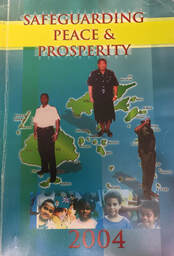
The small Muslim community in Fiji, which has historically proved conspicuously law-abiding and loyal to the country, was a potential incubator for religious zealots in the age of al-Qaeda related global terrorism, said the controversial and secretive Defence White Paper (DWP) 2004 (Left) that was prepared for the previous SDL government.
But in order to counter the influence and infiltration of the al-Qaeda in the country the Fiji Muslims, the Defence Paper recommended, should be recruited as an allay for the Fiji authorities in the war on global terrorism. The Nadi international airport was another potential terrorist target from international Islamic terrorists, warns the DWP.
Global terrorism had global reach, and therefore, said the DWP, threatened Fiji. Osama bin Laden’s al-Qaeda network of Islamic extremists had links to organisations in Southeast Asia such as Jemaah Islamiyah and Laskar Jihad. While such groups had more reason and opportunity to mount attacks within Southeast Asia than in the Pacific Islands, the Bali bombings in 2000, the DWP stated, showed the havoc that can be caused by a single attack on an international tourist destination. Australians, who were an increasing proportion of Fiji’s tourists, may have been a specific target in the Bali bombing. This was because of Australia’s close alliance with the United Sates of America, the DWP noted.
As regards the potential terrorist attack on international airports, especially the Nadi international airport, the DWP pointed out that such an attack could take the form of
* a bombing within or close to the airport terminal,
* the placement of a bomb on an aircraft,
* the hijacking of an aircraft bound either to or from Fiji, or
* the launching of a short-range missile by a terrorist near the perimeter of the airport against an aircraft landing or taking off.
Moreover, according to the DWP, Fiji was vulnerable not only as a target for international terrorism, but also as a transit point for terrorists organising an attack elsewhere in the region. A terrorist attack targeted against the transport our tourism industry anywhere in the region, and especially in Fiji, would have a devastating impact on the national economy of the country.
Although the DWP did not directly impute any terrorist intention to the Muslim community of Fiji, it did highlight the danger of al-Qaeda inspired infiltration of the community: ‘The small Muslim community in Fiji, mainly Sunni but with a minority of Shia adherents has historically proved to be conspicuously law-abiding and loyal to Fiji. The community is unlikely to harbour or tolerate Muslim extremists. The Muslim community should be recruited as an allay for the authorities in the war on terrorism, but the conjunction of anti-Americanism, Fijian participation in Iraq’s transition-despite being on private contract-and perceptions of discrimination at home is a potential incubator for zealots.”
In a separate but related analysis of Fiji’s participation in the Iraq conflict, the DWP however discounted any potential threat to the country’s internal security from the former soldiers and police recruited by the Global Risks Strategies (GRS) to act as guards and escorts in Iraq. The three-member Committee had also consulted the GRS in the preparation of the DWP.
There was some concern, noted the DWP, that returning GRS employees who failed to find other employment may become a security risk themselves. This may be so but the people employed have previous military or police training so this ‘industry is not adding to he potential problem of unemployed miscreants with military skills’.
Moreover, the DWP concluded, ‘they have witnessed the political power of the gun at home so will not be exposed to anything new there either’.
On 21 February 2003, the Sudanese-born Sheikh Majid was expelled from Fiji, despite being resident here for 18 years, when his work permit expired. The Fiji immigration authorities, acting on US and Australian ‘intelligence’ reports, claimed that Sheik Majid represented a security threat, despite non-disclosure of the alleged evidence. Sheik Majid was the director of the Islamic Institute of the South Pacific, based in Suva, and had worked closely with Fiji’s Muslim community.
The president of the Fiji Muslim League and former Government senator Hafiz Khan, while denying that the expulsion was a part of the anti-Muslim phenomena sweeping around the world, had however expressed regret at the manner and haste in which Sheik Majid was expelled from Fiji.
The Immigration officials had found $30,000 cash in the Sheik’s home, the money said to be a gift from a wealthy Saudi benefactor to the Fiji Muslims to celebrate Ramadan. The Muslim community had claimed that it was aware of the large funds and that no money had been spent without the approval of the Fiji Muslim Council.
The former Director of Immigration, Joseph Browne, went out of his way to reassure the Fiji Muslims that they were not being specifically targeted as a special religious group. Following Sheik Majid’s expulsion, on March 3, Fiji signed an “anti-terrorism” pact with the Australian government. A year later, in 2004, the DWP once again focused on the Fiji Muslims.
Although the DWP had been with the SDL government since 2004, it was only in 2006, during the election campaign, and following the dangerous standoff between the Prime Minister Laisenia Qarase and Commodore Voreqe Bainimarama, that the former admitted its existence. Prime Minister Qarase however had refused to divulge the contents or recommendations contained in the DWP.
Bainimarama: “Why should I listen to people like Chaudhry?” In 2008, he said: 'Why should I listen to Victor Lal that Mahend is hiding $2million?
"If the funds [$2MILLION] had been brought into the Fijian Inland Revenue at the time when they were paid by India into the accused's accounts, a time when they should have been; then the economy of this nation would have benefitted from having these funds in the current account and that benefit would have accrued to all Fijians. The only way to compensate the nation for the failure of the accused to comply with the law is to impose a large fine on him to bring money back into the revenue. Should he not pay that fine then he must serve a term of imprisonment in default...The public record of proceedings "Hansard" which was before me with an affidavit for interlocutory proceedings reveals that MPC vehemently denied the existence of the monies. Such disdain for the gift and its purpose and such deceit in hiding its existence for so long from the authorities can only be an aggravating factor in this sentence." - Justice Paul Madigan May 2014
*It was only when they fell out, MAHENDRA Chaudhry was finally arrested and convicted in 2014. So, Chaudhry is the last person to blow hot and cold but we REPEAT, like we did in 2008, that AIYAZ KHAIYUM must step aside. No ifs and buts.
* In 2008, when someone inside FRCA leaked Mahendra Chaudhry's 148-Page TAX FILE to our Founding Editor-in-Chief, the TWO (Bainimarama-Khaiyum) were behaving exactly in the same manner as they are now regarding calls that Aiyaz Sayed Khaiyum must STEP ASIDE because he is Attorney-General and Minister for Justice, in charge of
FICAC, POLICE and DPP.
* In Chaudhry's case, he was Minister of Finance and line manager of FRCA. Our Founding Editor-in-Chief had demanded that Chaudhry step aside because he owed outstanding tax while pushing for a TAX AMNESTY BILL, and one of his lackeys on the FRCA Board was making life hell for an Indo-Fijian staff member who was the last to have accessed his tax records.
* Although the poor female soul was not our Founding Editor-in-Chief's DEEP THROAT inside FRCA, she was repeatedly sent home but she stood her ground. An internal FRCA probe cleared her but she nearly suffered a nervous breakdown as FRCA Board Members tried to protect their boss Mahendra Pal Chaudhry
* Our Founding Editor-in-Chief also disclosed that Chaudhry was hiding $2million in his Australian bank account. Instead of removing him, Bainimarama-Khaiyum ordered the military to kidnap, detain, and deport Fiji Sun publisher Russell Hunter out of Fiji. He was declared a prohibited immigrant and banned from re-entering Fiji. The Interim Regime ignored a Fiji High Court order to stop the deportation
* The then director of the Fiji Human Rights Commission, Dr Shaista Shameem, carried out a lengthy investigation into the behaviour of the Fiji media and concluded that Hunter's deportation was justified and that if, and when, VICTOR LAL, stepped on Fijian soil, he must be arrested and charged for being in possession of Chaudhry's tax records. She cited NATIONAL SECURITY.
* Every small little tricks were rolled out to protect Chaudhry, including slapping a legal writ against the Fiji Sun and our Founding Editor-in-Chief, claiming we should not have got hold of his tax records
IN THE HIGH COURT OF FIJI
AT SUVA
CRIMINAL JURISDICTION
CRIMINAL CASE NO. HAC 137 of 2010
BETWEEN:
THE STATE
AND:
MAHENDRA PAL CHAUDHRY
BEFORE : HON. MR. JUSTICE PAUL MADIGAN
Counsel : Mr. M. Hutchings for the accused
Mr. M. Korovou for the State
Date of judgment : 4 April 2014
Date of sentence: 2 May 2014
SENTENCE
The accused, Mahendra Pal Chaudhry ("M.P.C."), has been found guilty of and convicted after trial of three counts, as set out hereunder:
FIRST COUNT
Statement of Offence
FAILURE TO SURRENDER FOREIGN CURRENCY: Contrary to Section 4 of the Exchange Control Act, Cap 211 and section 1 of Part II of the Fifth Schedule of the Exchange Control Act, Cap 211.
Particulars of Offence
MAHENDRA PAL CHAUDHRY in between the 1st day of November 2000 and the 23rd day of July 2010, at Suva in the Central Division being a resident in Fiji entitled to sell foreign currency but not being an authorised dealer, however being required by law to offer it for sale to an authorised dealer, retained the sum of $1,500,000.00 ($1.5 million) Australian Dollars for his own use and benefit, without the consent of the Governor of the Reserve Bank of Fiji.
SECOND COUNT
Statement of Offence
DEALING IN FOREIGN CURRENCY OTHERWISE THAN WITH AN AUTHORISED DEALER WITHOUT PERMISSION: Contrary to Section 3 of the Exchange Control Act, Cap 211 and section 1 of Part II of the Fifth Schedule of the Exchange Control Act, Cap 211.
Particulars of Offence
MAHENDRA PAL CHAUDHRY in between the 1st day of November 2000 and the 23rd day of July 2010, at Suva in the Central Division being a resident in Fiji but not being an authorised dealer, did lend the sum of $1,500,000.00 ($1.5 million) Australian Dollars to persons otherwise than an authorised dealer, namely the Financial Institutions in Australia and New Zealand as listed in Annexure marked "A", without the permission of the Governor of the Reserve Bank of Fiji.
THIRD COUNT
Statement of Claim
FAILURE TO COLLECT DEBTS: Contrary to Section 26(1)(a) of the Exchange Control Act, Cap 211 and section 1 of Part II of the Fifth Schedule of the Exchange Control Act, Cap 211.
Particulars of Offence
MAHENDRA PAL CHAUDHRY in between the 1st day of November 2000 and 23rd day of July 2010, at Suva in the Central Division being a resident in Fiji having the right to receive a sum of $1,500,000.00 ($1.5 million) Australian Dollars from the Financial Institutions in Australia and New Zealand as listed in Annexure marked "A", caused the delay of payment of the said sum, in whole or in part, to himself by authorising the continual re-investment of the said sum together with interest acquired back into the said Financial Institutions without the consent of the Governor of the Reserve Bank of Fiji.
- The brief facts of the case are that following the storming of Parliament in the year 2000, MPC, then Prime Minister, was unlawfully imprisoned along with his son and many others in Parliament House in Suva. He was badly treated during the time of imprisonment. On his release he travelled to India where he met a lot of sympathy and support. That support soon manifested itself into donations made to enable him and his family to distance themselves from Fiji and settle in Australia.
- These funds were a gift from certain individuals and organisations in India. In about November 2000, the Consul-General for India based in Sydney progressively between 2000 and 2002 deposited the monies directly into MPC's Sydney bank account with the Commonwealth of Australia Bank. The funds totalled approximately AUD $1.5 million. MPC retained these funds in that bank and with other banks always under his own name. He invested the funds and made deposits to other banks thereby creating loans to those institutions.
- In a letter dated 23 October 2009, solicitors for the Reserve Bank of Fiji wrote to MPC advising him that the Reserve Bank was of the view that he was in breach of certain sections of the Exchange Control Act by retaining the overseas funds, and by not repatriating the funds to Fiji as required.
- MPC replied by asking for further and better particulars of his alleged breach, which letter went unanswered until such time that he was charged with these offences.
- These letters would show that at least as early as October 2009, MPC was on notice that his holding and lending of the funds was perhaps irregular.
- Despite that notice the convict has since that time steadfastly refused to accept that he might have been in breach by remorselessly instructing several eminent Senior Counsel, one after the other, to make multiple applications for recusal, stay and quashing of the information – none of which succeeded. It is of course his right to make as many interlocutory applications that he wishes, but the number and merit of the applications inevitably led to the conclusion that he was in a state of denial as to his alleged violations of the law.
- The Exchange Control Act ("ECA") was enacted in Fiji in 1957 and is modelled on the Act enacted in the United Kingdom in 1947. It is, in essence, a financial instrument to regulate and preserve the foreign exchange situation in the nation. As the Supreme Court said in Reddy v. Governor of the Reserve Bank CBV 0001.93:
It may well be that it has served its purpose in Fiji but nevertheless it is still law and the Courts must of course adjudicate on any charges laid for breaches of its provisions. Such charges will be heard according to law.
- And so in this case Mr.Chaudhry has been found guilty and convicted of breaches of s.3, section 4 and section 26 of the Act. The penalties laid down by section 3 of Part II of the Fifth Schedule of the Act are a maximum term of imprisonment of two years, forfeiture of the foreign funds in question and a fine not exceeding the equivalent of AUD $4.5 million.
- For each day that the accused is retaining foreign currency in Australia and New Zealand without the permission of the Minister, he is in continuing breach of the provisions of the Exchange Control Act. The monies must be either forfeited or sold to an authorised dealer.
- If the funds had been brought into the Fijian Inland Revenue at the time when they were paid by India into the accused's accounts, a time when they should have been; then the economy of this nation would have benefitted from having these funds in the current account and that benefit would have accrued to all Fijians. The only way to compensate the nation for the failure of the accused to comply with the law is to impose a large fine on him to bring money back into the revenue. Should he not pay that fine then he must serve a term of imprisonment in default.
- Counsel for the accused tells me that he would have brought the funds back into Fiji if the Reserve Bank had answered his letter requiring further and better particulars.This submission is disingenuous in that the accused's letter to the Bank was no more than a delay tactic – he had none-the-less been warned that he might be in breach.
- In a lengthy and very eloquent plea in mitigation, Mr. Hutchings invites the Court to find that the offences his client has been convicted of are of such insignificance that the convictions should not be recorded and that he should be discharged on each of the three counts. He canvassed the background in detail to MPC's "career" in politics in Fiji and in particular emphasised the stress, torture and oppression he had suffered in both 1987 and in 2000. He reminded the Court of the rationale behind the gift from the peoples of India which was to resettle him and his family in Australia.
- Mr. Hutchings submitted that MPC has not done anything to conceal the funds, had not dissipated them and had since discovery kept them intact save as to invest them in interest bearing accounts. Even when it eventually came to trial, he submits that MPC agreed to ensure that the proceedings progressed efficiently and that facts were agreed to the extent that the prosecution had little need to call evidence.
- He submits that there are no aggravating features that would lead to enhancement of sentence.
- In placing reliance on section 4(2)(e) of the Sentencing & Penalties Decree 2009 ("SPD") he submits that convictions against his name would prevent him from standing for parliament in the forthcoming elections. Section 4(2)(e) makes it incumbent on me to have regard to the impact of an offence on any victim of the offence. That I do and I consider the people of Fiji as the victims of the offending. The section does not compel me to consider the impact of the conviction on the offender. To that extent Mr. Hutching's submission is misconceived. He has misread the import of the section. The impact of the convictions on MPC are consequences entirely brought about by his own intransigence. Had he at first call repatriated the monies it is more than likely he would not have been prosecuted or if he were, that he would be penalised by a small token fine. The matter has gone too far now for such leniency to be extended to him.
- Mr. Hutchings prays in aid of his mitigation the dicta of the Honourable Chief Justice in Batiratu HAR 001 of 2012 in which it was held that it was proper to discharge an accused without conviction if:
- (i) the offender is morally blameless.
- (ii) the breach is merely technical.
- (iii) the offence is trivial or minor.
- (iv) the public interest would not require a conviction.
- (v) where it would be inappropriate to record a conviction.
- (vi) other exceptional circumstances, rarely, would justify such a merciful step.
- In relying on the Batiratu case, counsel does not appear to appreciate the real ratio of that case. That is that there must be equality before the law meaning that every accused person whether he be a Prime Minister or a garbage collector must be treated alike. The Chief Justice (Gates) said this: (at para 33):
- In testimony to his character, MPC called three witnesses.
- First, Ratu Epeli Ganilau, a retired army officer and Minister of State told the Court that when he was Chairman of the G.C.C. from 2001 to 2004 and as Minister of State from 2006 to 2011, he came to know MPC as a colleague. MPC was at the time the Minister for Finance when he (R.E.G.) was Minister for Fijian Affairs and Minister for Defence. R.E.G. found him to be an "interesting" person. He respected him as a capable, honest, meticulous and hardworking Government Minister. He was very knowledgeable with the machinery of Government and especially the financial situation, the sugar industry and he had impressive work ethics.
- Secondly, Madam Taufa Vakatale told the Court she had known MPC since the early 70s when he was a young auditor and would come to A.C.S. where she was the principal. She has found him to be serious, meticulous and conscientious. When they were both politicians in different camps, she nevertheless respected his views and his "commitment to the national cause". She has always found him to be professional honest, forthright and an effective leader. Madam Vakatale expressed views on his culpability for breaches of the E.C.A.; views that the Court cannot accept in light of the convictions entered.
- The third "character" witness was Father Kevin Barr. He said that he was a good friend of MPC but then launched into what can only be described as a political anti-government speech. More outrageously he cast disparaging remarks on the nature of these proceedings against MPC by saying that it was a "sad attempt to discredit a great and honourable leader and a man of integrity for petty, vindictive reasons". He attempted to "soften" this totally contemptuous claim with the preface "some see this current case as ..." In the light of this contempt of court I give no weight whatsoever to Fr. Barr's testimonial and it also serves to cancel the worth of the rest of the character evidence. Mr. Hutchings knew this was coming because he had a typed copy of Fr. Barr's antipathy. Counsel must be seen as a party to this contempt of court.
- When the convictions were entered against MPC on the 4th April 2014, counsel then asked that mitigation be delayed for some three weeks to allow evidence to be prepared as to MPC's dire medical condition. This evidence, the Court was told was to come from Sydney. The Court reluctantly agreed, despite the fact that it was an unusually long time to await sentence and a practice that is not to be regarded as a precedent. In all criminal cases, the sooner that sentence is passed the better for all parties concerned.
- It comes as a matter of surprise therefore that in his mitigation, Mr. Hutchings, placed very little emphasis on MPC's medical state, producing a report from the Nasese Medical Centre (Suva, not Sydney) dated 14 April 2014. Dr. deAsa repeats unsupported evidence of symptoms found in a medical check-up in Chennai, India in January 2009. Unsupported hearsay evidence of an old examination that the Court does not accept.
- Dr. de Asa opines himself that MPC has mild high blood pressure and a physical examination was unremarkable. He has good control of his cholesterol and maintains a healthy exercise regimen. The doctor finds that he has mild symptoms of angina and would recommend a cardiological follow-up.
- Another medical report was submitted, a report from the Suva Bayview Medical clinic dated September 27, 2011. Apart from findings that the health of MPC was unremarkable his cardio-vascular system was "normal". It is such an unremarkable report and a report so old that the Court places very little weight on it.
- The evidence before the Court is that the monies were provided by Indian well-wishers to enable MPC and his family to settle in Australia. MPC did not do that - his counsel tells me that he wanted to return to this country to continue his political life. The intent of the well-wishers' gift was as a result frustrated and MPC made the most of this "windfall" by investing it to his own benefit. It was never brought to the attention of Fijian authorities or of the Fijian public that he had been in receipt of those monies for some years. In an affidavit before Goundar J and referred to by that learned Judge in Chaudhry v. State HAM 034 of 2011 (25 July 2012) at para 5, MPC himself had deposed:
Again according to the judgment of Goundar J. at para 7 the issue of these funds was raised in parliament on the 2nd December 2005 by the then Prime Minister, LaiseniaQarase. The public record of proceedings "Hansard" which was before me with an affidavit for interlocutory proceedings reveals that MPC vehemently denied the existence of the monies. Such disdain for the gift and its purpose and such deceit in hiding its existence for so long from the authorities can only be an aggravating factor in this sentence.
- From the eventual admission to FRCA of the existence of the monies until today, the accused has shown not a shred of remorse for his breaches and appears to have been in a state of denial since 2008 that he could perhaps be in breach of the E.C.A. This is despite the advice he has received of possible breach from respected Fijian law practitioners and from eminent senior counsel in both Australia and New Zealand. Such lack of remorse and dogged interlocutory attempts to derail proceedings and to "shop" for a more "pliant" judge must also be an aggravating factor.
- The Court cannot accept the defence submission that this is but a "technical" breach and of very insignificant culpability. It is a wilful and determined breach of the Act in spite of warnings and advice and a breach that the accused allowed to continue over a period of years. A technical breach might perhaps be committed by a new immigrant to Fiji who has left unforgotten a current bank account in Hong Kong with a few hundred dollars to its credit. Technically abreach but with no intention to defeat the revenue or to continue to do so.
- Nor is the breach insignificant. It has been the retention of a very large sum of money in Fiji terms over a long period and for some of that period intentionally concealed. The degree of culpability if anything must be medium to high.
- This Court has no intention to forfeit the funds held but it will make an order in consideration of section 4 of the S.P.D. which will benefit the people of Fiji, a "victim," albeit to a small degree, of the accused's infraction. A fine will serve not only to bring a large part of the funds back into the revenue but will also benefit the balance of payments of the State. Orders must be also made that will regularise the accused's state of continuous offending against the E.C.A.
- Pursuant to section 1(4) of part II of the Fifth Schedule to the ECA"where the offence is concerned with any currency....", the maximum fine is three times the amount of the currency.
- I regard the convictions for the three breaches of the Act be all part of the same offending and the sentence passed therefore will be concurrent. The fine I am about to order is an aggregate fine in terms of section 33 of the S.P.D. I have made enquiries of the counsel for the accused of his ability to pay a fine and am aware that he is, according to the admitted facts at trial, in control and ownership of a large sum of money in Australia. Apart from no longer being able to invest those funds, the fine will not impose a co-existent impossible burden on the accused in terms of section 32(1) of the SPD.
- I now proceed to make the following sentencing orders:
- I order that the convictions remain recorded against the accused's name.
- I order that he pay a fine of 20,000 penalty units (equivalent to FJD $2 million).
- I order that the fine be paid into Court by 30 June 2014 failing which he is to serve a term of imprisonment of 15 months in default.
- If MPC is to serve a term of imprisonment pursuant to Order No.3 hereof, he is to serve a minimum term of 12 months before being eligible for parole.
- MPC is to comply with the terms of the E.C.A. and offer all of his foreign funds held abroad to an authorised dealer, such repatriation to be effected by 31 July 2014. Failure to do so will make him liable to prosecution for continuing breach of the E.C.A.
- I order that the prohibition to access his funds be lifted as of today.
- I order that the accused continue to be barred from travel out of Fiji until he has complied with Orders 2,3 and 4. Once the fine is paid or the sentence is served he will then be free of restrictions save as to the need to comply with Order 5.
Judge
At Suva
2 May2014

